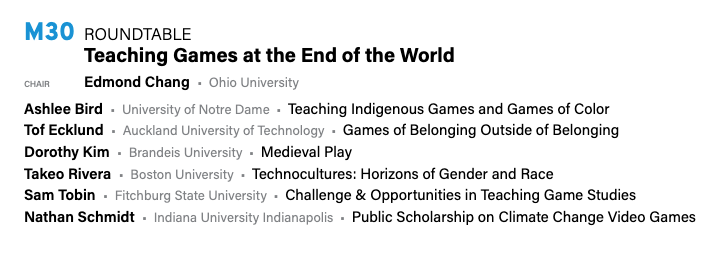I cannot believe March is already here and nearly a week in! I was hoping that the month would be a nice respite from the crush of January and February, which turned out to be way busier than I thought they would be, but I now realize (checking my calendar) that I will be traveling three times this month. First up is SCMS 2024 in Boston. I organized and am chairing a roundtable called “Teaching Games at the End of the World,” which will be on Saturday, March 16, at 6:00-7:45 PM:

The description of the roundtable reads:
Climate change. Global conflict. Democracies and liberties imperiled. Economic collapse. Education under fire. What does it mean to teach at the end of the world? More precisely, what does it mean to teach games at the end of the world? This roundtable brings together a range of interdisciplinary scholars, designers, artists, and practitioners to address how video games—often imagined and played in the domain of fun, leisure, or escape—might offer ways to address and analyze the perils of the contemporary moment and to offer alternative modalities, pedagogies, desires, and worlds that offer different possibilities, lifeways, and even solaces.
“There is no longer any question that we are living in compromised times,” argues Natalie Loveless, Professor or History of Art, Design, and Visual Culture at the University of Alberta and the author of How to Make Art at the End of the World: A Manifesto for Research-Creation. Loveless continues, “The arts have an important and often overlooked part to play in this context. They offer modes of sensuous, aesthetic attunement, and work as a conduit to focus attention, elicit public discourse, and shape cultural imaginaries.” Here video games might serve similar aims to present new information, create opportunities for exploration and collaboration, and to reimagine what was, what is, and what might be. The popularity and ubiquity of games offers an opportunity to reach eyes, ears, hands, and hopefully, hearts and minds, especially in light of marketing data that reveals there are 3.09 billion video game players globally and the industry is valued at $385 billion. Bryan Alexander, futurist, writer, and senior scholar at Georgetown University, calls for a shift in the ways we teach, engage new media, and respond to climate change and “universities on fire.” He argues in “Teaching at the End of the World” that augmented reality, digital storytelling projects, and even video games offer different modalities and mediums for student learning and cultural change; in fact, he says, “Academic faculty may also teach openly optimistic content. Positive visions of the future from science fiction, seen through text, video, music, art, and games, may inspire students to think of climate [and other] futures they can help create that are not horrific and that summon up their creative and analytic capabilities.”
Thanks to my fellow presenters and co-conspirators: Ashley Bird, Dorothy Kim, Takeo Rivera, Tof Ecklund, Sam Tobin, and Nathan Schmidt.